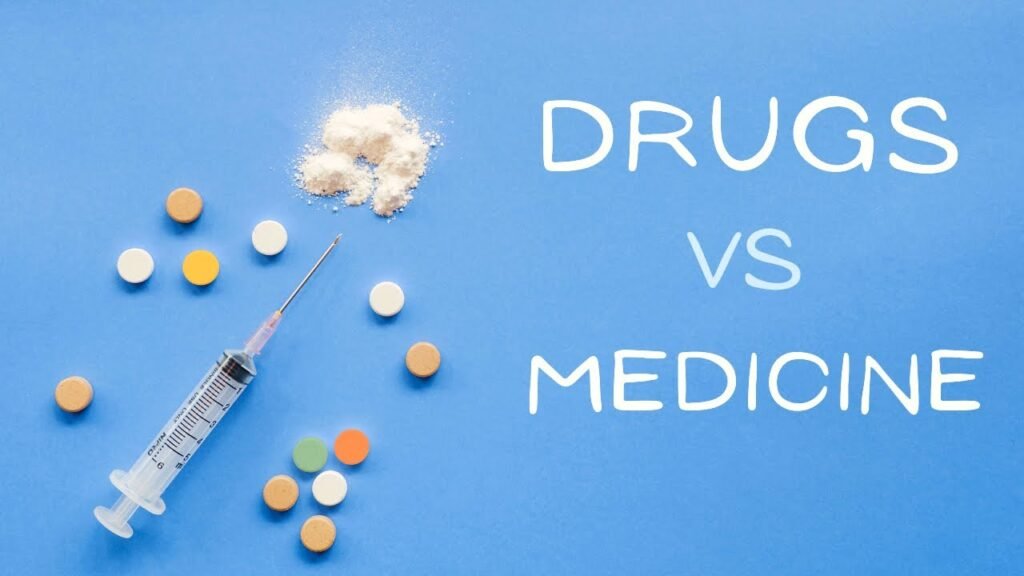Deciphering the Distinction:
In the vast realm of healthcare, the terms “drugs” and “medicines” are often used interchangeably, yet their subtle distinctions hold paramount importance. Understanding these nuances is pivotal, not only for healthcare professionals but also for consumers navigating the complex landscape of pharmaceuticals. In this comprehensive guide, we embark on a journey to decipher the intricate differences between drugs and medicines.

Defining the Terms: Clarifying Concepts
Drugs
Drugs, in the broadest sense, encompass a wide array of substances that exert physiological effects on the body. These substances may range from naturally occurring compounds to synthetically manufactured chemicals. In medical contexts, drugs typically refer to pharmaceutical compounds used for therapeutic, diagnostic, or preventive purposes.
Medicines
On the other hand, medicines specifically denote pharmaceutical substances administered with the intent to treat, alleviate, or prevent diseases, disorders, or symptoms. Medicines undergo rigorous testing, evaluation, and regulatory scrutiny to ensure safety, efficacy, and quality standards.
Key Distinctions: Delving Deeper
Purpose and Function
While both drugs and medicines aim to influence physiological processes within the body, their primary purposes and functions diverge. Drugs encompass a broader spectrum of substances, including recreational drugs, substances of abuse, and pharmaceutical agents. In contrast, medicines are specifically formulated and prescribed for therapeutic purposes, targeting specific diseases or symptoms.
Regulatory Oversight
One of the fundamental distinctions lies in regulatory oversight. Medicines are subject to stringent regulations imposed by health authorities to safeguard public health. These regulations govern various aspects, including manufacturing standards, clinical trials, labeling requirements, and post-market surveillance. Compliance with regulatory frameworks ensures that medicines meet established safety, efficacy, and quality benchmarks.
Clinical Application
In clinical practice, the differentiation between drugs and medicines holds significant implications. Healthcare professionals, including physicians, pharmacists, and nurses, play pivotal roles in prescribing, dispensing, and administering medicines to patients. The selection of appropriate medicines involves careful consideration of factors such as diagnosis, patient characteristics, therapeutic goals, and potential adverse effects.
Patient Safety and Education
Patient safety and education constitute paramount concerns in healthcare delivery. Proper understanding of the distinctions between drugs and medicines empowers patients to make informed decisions regarding their health and treatment options. Healthcare providers play a crucial role in educating patients about the therapeutic benefits, potential risks, and proper usage of prescribed medicines.

Understanding the difference between drugs and medicines is crucial, as they serve distinct purposes despite often being used interchangeably.
- Definition:
- Drugs: This term typically refers to any substance that affects the body’s functions when consumed. It encompasses a wide range of substances, including legal and illegal drugs.
- Medicines: Medicines are a subset of drugs that are specifically used to prevent, treat, or alleviate symptoms of medical conditions. They are regulated and intended for therapeutic purposes.
- Intended Use:
- Drugs: Their primary purpose might not necessarily be medicinal. Drugs can be recreational, addictive, or even harmful if misused.
- Medicines: These substances are designed and prescribed to diagnose, treat, cure, or prevent diseases, ailments, or medical conditions.
- Regulation:
- Drugs: They can be legal or illegal, depending on the substance and its usage. Regulatory bodies monitor drugs to prevent abuse and ensure public safety.
- Medicines: Governments regulate medicines to ensure their safety, efficacy, and quality. They undergo rigorous testing and must meet specific standards before being approved for medical use.
- Ingredients and Formulation:
- Drugs: Ingredients in drugs can vary widely, and they might not always be disclosed accurately. Some drugs contain harmful additives or substances.
- Medicines: Medicines contain specific active ingredients, often listed on the packaging. Their formulations are tailored to provide therapeutic benefits with minimal side effects when used as directed.
- Healthcare Provider Involvement:
- Drugs: While some drugs are available over-the-counter, many require a prescription from a healthcare provider due to their potential risks or the need for proper dosage management.
- Medicines: Healthcare providers play a crucial role in prescribing and managing medicines, ensuring they are used appropriately and effectively.
- Outcome and Purpose:
- Drugs: The effects of drugs can vary widely, ranging from altering mood and perception to inducing physiological changes. Some drugs may be used for medical purposes, while others are purely recreational or illicit.
- Medicines: The primary goal of medicines is to promote health and alleviate suffering by treating or managing medical conditions. They are intended to improve quality of life and aid in recovery from illness or injury.
Frequently Asked Questions (FAQ) about Drugs and Medicines
1. What is the difference between drugs and medicines?
- Drugs: This term encompasses any substance that affects the body’s functions when consumed, including legal and illegal substances.
- Medicines: Medicines are a subset of drugs specifically used for therapeutic purposes, such as preventing, treating, or alleviating symptoms of medical conditions.
2. Are all drugs considered medicines?
- No, not all drugs are considered medicines. While medicines are a type of drug used for therapeutic purposes, drugs include a broader range of substances, including recreational drugs and substances with potential for abuse.
3. How are drugs and medicines regulated?
- Drugs and medicines are regulated by governmental health agencies to ensure safety, efficacy, and quality. Medicines undergo rigorous testing and must meet specific standards before approval for medical use. The regulation of drugs also aims to prevent abuse and protect public health.
4. Do I need a prescription for all medicines?
- While some medicines are available over-the-counter (OTC) and can be purchased without a prescription, others require a prescription from a healthcare provider. Prescription medicines often have stricter controls due to their potential risks or the need for proper dosage management.
5. Can drugs be harmful?
- Yes, drugs can be harmful, especially when misused or abused. Some drugs can lead to addiction, overdose, or adverse health effects. It’s essential to use drugs, including medicines, responsibly and as directed by healthcare professionals.
6. How can I ensure the safe use of medicines?
- To ensure the safe use of medicines, it’s crucial to:
- Follow the prescribed dosage and administration instructions.
- Disclose all medications, including OTC drugs and supplements, to healthcare providers.
- Store medicines properly and out of reach of children.
- Report any adverse reactions or side effects to healthcare providers promptly.
7. Are there risks associated with herbal remedies and supplements?
- Yes, herbal remedies and supplements can also pose risks, including interactions with other medications and potential side effects. It’s important to consult with a healthcare provider before using herbal remedies or supplements, especially if you have underlying health conditions or are taking other medications.
8. How can I differentiate between legitimate medicines and counterfeit drugs?
- Legitimate medicines are approved by regulatory authorities and are obtained from licensed pharmacies or healthcare providers. Counterfeit drugs are unauthorized and may contain harmful substances or incorrect dosages. To avoid counterfeit drugs, purchase medicines from reputable sources and verify their authenticity through official channels.
9. Can medicines expire?
- Yes, medicines can expire, and using expired medicines may be ineffective or potentially harmful. It’s essential to check the expiration date on medicine packaging and dispose of expired medications properly according to local guidelines.
10. Where can I find reliable information about drugs and medicines?
- Reliable information about drugs and medicines can be obtained from healthcare providers, reputable medical websites, and official resources provided by governmental health agencies or professional organizations. Avoid relying on unverified sources for medical information
11. What should I do if I miss a dose of my medication?
- If you miss a dose of your medication, it’s important to follow the instructions provided with your prescription. In many cases, you can take the missed dose as soon as you remember, but if it’s almost time for your next scheduled dose, it’s best to skip the missed dose and resume your regular dosing schedule. Do not double the dose to make up for a missed one unless instructed by your healthcare provider.
12. Can I drink alcohol while taking medication?
- It depends on the specific medication you’re taking. Some medications can interact with alcohol, leading to increased side effects or reducing the effectiveness of the medication. It’s essential to consult with your healthcare provider about whether it’s safe to consume alcohol while taking your medication.
13. Are there any dietary restrictions I should follow while taking certain medications?
- Certain medications may require dietary restrictions to avoid interactions or enhance their effectiveness. For example, some medications should be taken with food to reduce stomach irritation, while others may require avoiding specific foods or beverages due to potential interactions. Always follow the dietary instructions provided with your medication or consult with your healthcare provider for guidance
14. How long should I continue taking my medication?
- The duration of medication treatment varies depending on the medical condition being treated and the type of medication prescribed. Some medications are taken for a short-term course to address acute conditions, while others may be necessary for long-term management of chronic conditions. It’s important to follow your healthcare provider’s instructions regarding the duration of your medication treatment and to not discontinue medication abruptly without consulting them.
15. Can I take multiple medications at the same time?
- It’s common for individuals to take multiple medications simultaneously, especially if they have multiple medical conditions or are managing chronic illnesses. However, it’s important to be cautious about potential interactions between medications. Always inform your healthcare provider about all medications, including over-the-counter drugs and supplements, to ensure they are compatible and safe to use together.
16. What should I do if I experience side effects from my medication?
- If you experience side effects from your medication, it’s important to report them to your healthcare provider promptly. They can assess the severity of the side effects and determine whether any adjustments to your medication regimen are necessary. In some cases, side effects may subside over time or with changes in dosage or medication formulation.
17. Can I share my prescription medication with others?
- No, it’s not safe or legal to share prescription medication with others. Prescription medications are specifically prescribed based on individual medical conditions and health status. Sharing medication can lead to harmful consequences, including allergic reactions, adverse interactions, and improper use. Always use prescription medications only as prescribed by your healthcare provider.
18. What should I do with leftover or unused medication?
- Proper disposal of leftover or unused medication is important to prevent misuse, accidental ingestion, or environmental contamination. Many pharmacies and healthcare facilities offer medication take-back programs for safe disposal. If a take-back program is not available, follow local guidelines for safe medication disposal, such as mixing the medication with undesirable substances (e.g., coffee grounds or cat litter) and placing it in a sealed container before throwing it in the trash.


